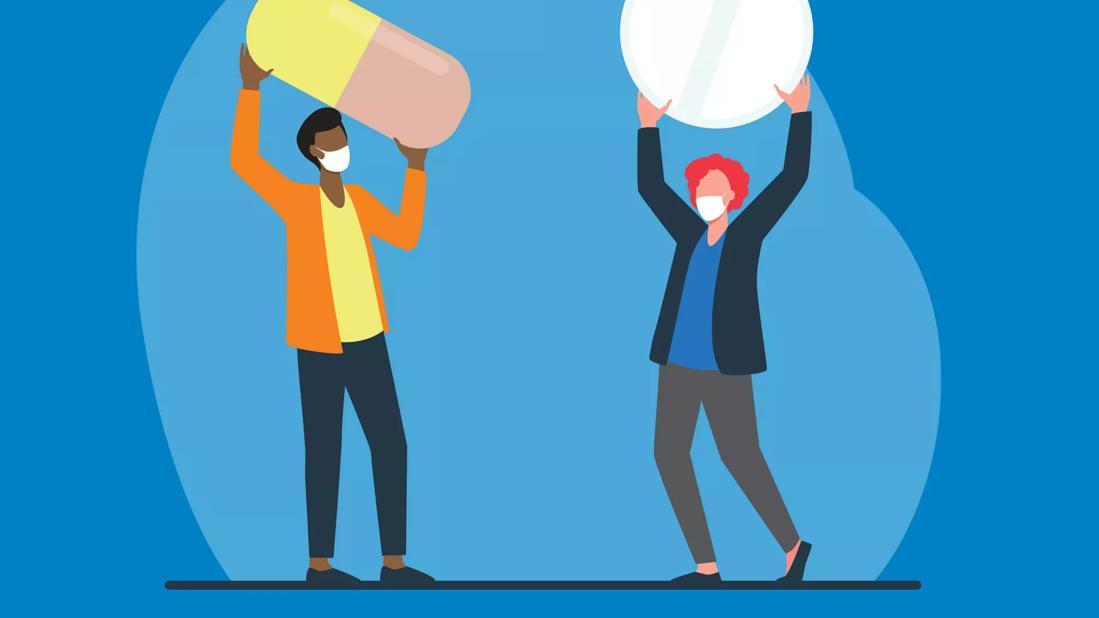Both can have similar effects, but one may work better than the other for you

The U.S. Centers for Disease Control and Prevention (CDC) estimates 6 million children in the United States have been diagnosed with attention-deficit/hyperactivity disorder (ADHD). That’s about 11% of U.S. kids. Worldwide, about 7% of kids have been diagnosed.
Advertisement
Cleveland Clinic is a non-profit academic medical center. Advertising on our site helps support our mission. We do not endorse non-Cleveland Clinic products or services. Policy
And it’s not just kids who are affected. More than 4% of U.S. adults are living with ADHD, too.
Medication is commonly recommended for people over the age of 6 who are diagnosed with ADHD. The most common stimulant medications for ADHD include Ritalin® (methylphenidate) and Adderall® (amphetamine).
While they work in different ways on your brain, they share a lot of common characteristics.
How do you know which is right for you or your child? And what can you expect from ADHD treatment? Pediatric behavioral health specialist Michael Manos, PhD, explains.
We all have trouble focusing our attention at times. And sometimes, we all can find it difficult to follow directions, organize our thoughts or plot out our next steps. But it comes and goes.
But for people with ADHD, these impulses don’t ebb and flow. They’re almost always there. And they disrupt daily life.
That’s because ADHD causes executive dysfunction — which means it keeps you from being able to control your thoughts, emotions and behavior. People with ADHD often find it difficult to:
Researchers theorize that ADHD may have been evolutionarily beneficial to early humans. And that’s because people with ADHD are more likely to be hyper-aware of their surroundings. The idea goes that in early societies, that ability helped hunters keep safe from danger and better stalk potential food.
Advertisement
But in today’s world, living with ADHD can cause serious disruptions. Rather than protecting you from danger, that vigilance to your surroundings isn’t as useful in many aspects of modern life.
Being highly in tune with their surroundings means kids with ADHD can be easily distracted and have trouble concentrating in school. (Someone’s walking on the side of the room. I need to see what they’re doing.)
And adults with ADHD may find it difficult to complete certain tasks at work and in their personal lives. Or to remember what they’re supposed to be doing. (Procrastinating, again? Nah. I do my best work under pressure.)
ADHD is a lifelong disorder. Children with ADHD often see symptoms continue through adulthood. Many adults were never diagnosed as kids but later come to realize they have symptoms of adult ADHD.
Medication is the first-line treatment for managing ADHD. Medications don’t cure ADHD, but they can lessen the symptoms.
The two most common stimulant medications for treating ADHD are Ritalin and Adderall. Both are available in a variety of dosages and ways to take them.
“There are more than 30 different delivery methods for each medication,” Dr. Manos explains. “There are pills, gummies, liquids, patches, chewables and more. Some are faster-acting; some are longer-lasting. There’s a lot of variation.”
Both Ritalin and Adderall help your brain relay messages more effectively. But the process of how they go about their work is different. Dr. Manos breaks them down.
Ritalin is a brand name in a class of medication called methylphenidate, which has been used to treat ADHD symptoms since the 1950s. Other brand names in the class include:
Methylphenidates like Ritalin and others work like this:
Your brain relays messages through your body via a series of connections called synapses. Words travel from one synapse to the next to create coherent thoughts and actions.
Between each synapse is a small gap. That’s normal. But in the brain of a person with ADHD, messages can get lost as they attempt to cross those gaps.
Think of it like a rickety bridge over a valley — those ones you see in action movies or cartoons where they’re suspended by ropes and there’s a big drop below. There’s always a broken plank or two that the hero has to jump over if they’re going to get to the castle and save the day.
In the case of a person with ADHD, the hero doesn’t cross the gap. They turn around and go back the way they came.
Advertisement
In your brain, that’s called synaptic reuptake. It means the message returns to its original synapse instead of moving along to the next. The message doesn’t make it to the next plank on the bridge.
Ritalin and Adderall both stop reuptake from happening. They don’t let the hero turn around. They push the message forward, over the gap to the next plank.
The messages are carried by neurotransmitters.
Ritalin works by blocking the reuptake of two neurotransmitters: dopamine and norepinephrine (aka noradrenaline). Those are the neurotransmitters responsible for things like attention, impulse control and more.
When a person with ADHD takes Ritalin, their dopamine and norepinephrine can’t turn around when they come to a gap between the planks on the bridge. They keep moving forward. That effectively helps you concentrate better, control impulsive actions and manage other symptoms of ADHD.
Adderall is in a class of medications called amphetamines. Amphetamines also help messages cross the bridge, but in other ways.
Advertisement
Amphetamines effectively work on your brain’s message relay system in four ways. Ritalin works in one way — blocking reuptake. But that doesn’t mean Adderall is better or more powerful or more effective than Ritalin. It’s all a matter of how your brain and body respond.
“The true usefulness of medicine is whether it works for an individual,” Dr. Manos states. “As physicians, we’re looking for what makes a difference in the life of the patient that is sitting in front of us. So, it’s not a matter of what each class of medication does. It’s about what that medication does for you.”
Amphetamines have been used to treat ADHD in the U.S. since about 1960. In addition to Adderall, other amphetamine brands used for ADHD include:
Unfortunately, knowing whether Ritalin or Adderall will work better for you or your child isn’t a cut-and-dry question.
Some people respond better to Ritalin. And some respond better to Adderall. Currently, research hasn’t definitively shown which medication is more likely to be effective for any particular person.
For example, it’s not as easy as saying one is better for kids. Or one works better for adults. Or that one is more effective for treating people whose dominant symptom is hyperactivity versus someone for whom inattention is the primary concern.
Advertisement
So, healthcare providers use their best judgment to prescribe each medication. They then monitor its effects over time. If that medication doesn’t seem to be doing the trick, or if the side effects are too much, they’ll adjust the dosage, try a different delivery method or switch to another class of medication.
Dr. Manos and others are currently working on a study to take out some of the guesswork from prescribing ADHD medications.
“Currently, physicians will determine their own criteria for using one medication or the other, based on their experience,” Dr. Manos explains. “We’re analyzing what really makes one medication more effective for certain cases than others. In other words, what are the characteristics of the person or the condition that respond better to Ritalin versus Adderall? And vice versa.”
Dr. Manos says it’s common for people to worry about the potential for ADHD medication to be addicting. But when used as prescribed to the people they’re prescribed to, neither Ritalin nor Adderall have been proven to be addictive.
But the problem lies in their potential to be misused.
“These are the most commonly circulated drugs on college campuses,” Dr. Manos notes. “Using them to pull an all-nighter to write a paper or to cram for finals. That’s where the trouble stems.”
It’s not that Ritalin or Adderall is chemically addictive in the same way as something like cocaine, which hijacks your brain’s pleasure centers. It’s more that people can become psychologically addicted. You like the effects the medication has on you. You like being able to focus, do more and complete your projects without distraction. And so you take more and more.
Researchers say misusing prescription medications for ADHD, like Ritalin or Adderall, is linked to a number of very serious effects, including:
Because of the risk of misuse, Ritalin and Adderall are considered controlled substances. In some states, you may only be able to fill small 30-day supplies of these medications at a time. That’s an effort to cut down on overuse.
While stimulant medications like Ritalin and Adderall are the most common treatments for ADHD, they’re not the only options.
Some people with ADHD manage their symptoms with prescription non-stimulant medications, like norepinephrine reuptake inhibitors or alpha-2 adrenergic agonists. Some antidepressants can also be effective for some people.
Both non-stimulant and antidepressant medication may be used on their own or in combination with stimulants like Ritalin or Adderall.
Additionally, behavioral therapy (also with or without medication) can help some people learn skills to manage the effects of living with ADHD. Parents with young children who’ve been diagnosed with ADHD are often recommended to take part in behavior management training to help their child.
Ritalin and ADHD aren’t the only options for managing the symptoms of ADHD, but they’re some of the most common and effective. If you or your child have been diagnosed with ADHD, know that trying new medications and new approaches to managing symptoms is normal. Each medication may have different effects for different people. With patience, you’ll likely find a solution that works for you.
Learn more about our editorial process.
Advertisement

ADHD replaced ADD as a more accurate term for a common neurodevelopmental disorder

Background stimulation and intentional fidgeting may actually help you stay on task

A booster dose, healthy snack and some downtime may help ward off a medication rebound

Working side by side with another person can improve focus, build accountability and provide motivation to get a task done (or at least started)

The medical condition isn’t a learning disability and doesn’t always cause hyperactivity

There are times and cases when physician-supervised breaks may be beneficial

Using time management tools, adopting new approaches and allowing for a little grace can help meet deadlines and finish tasks

Boys might seem disruptive, while girls might seem inattentive, but ADHD isn’t a sex-specific condition

Wearing a scarf, adjusting your outdoor activities and following your asthma treatment plan can help limit breathing problems

Your diet in the weeks, days and hours ahead of your race can power you to the finish line

When someone guilt trips you, they’re using emotionally manipulative behavior to try to get you to act a certain way